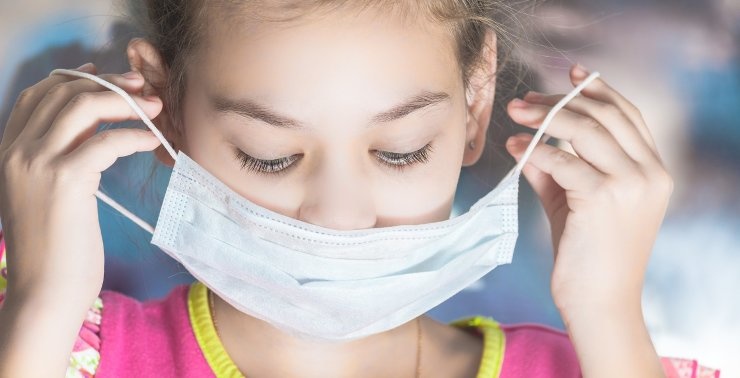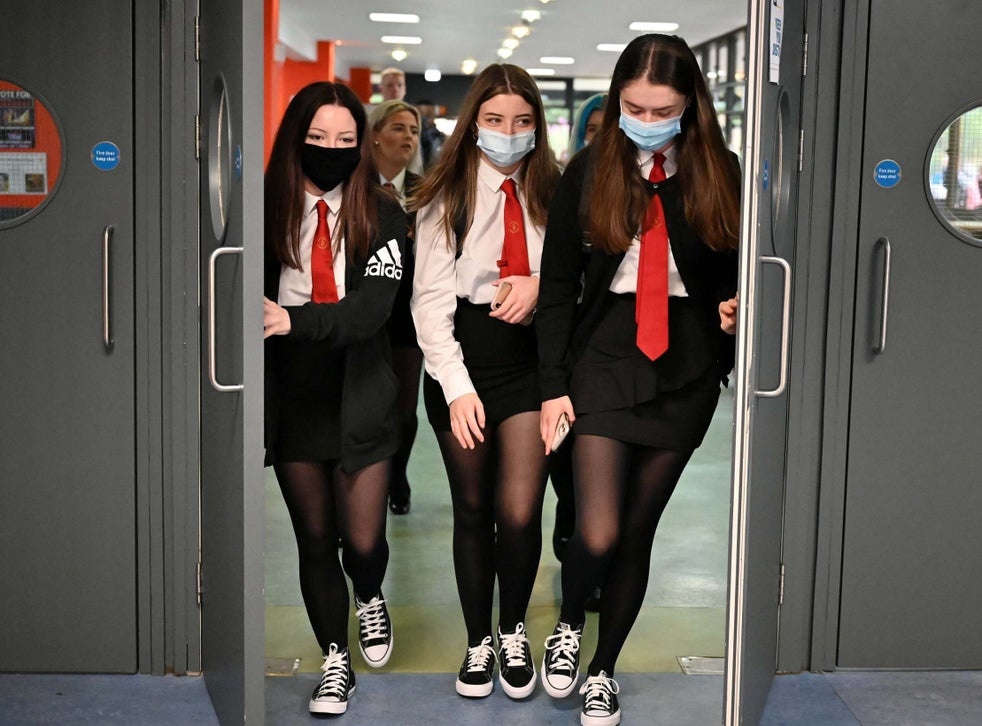
Communication for virtually all deaf children and young people, including those who use sign language, relies in part on being able to see someone’s face clearly – whether this is for lip-reading, understanding facial expressions or for understanding non-verbal communication more widely (e.g. seeing whether someone is smiling or looks upset). Face masks and coverings can also have the effect of obscuring speech, making it harder for deaf children to make use of any residual hearing they have.
Many deaf young people and families have contacted with us with concerns about the impact that the widespread use of face masks and coverings will have on their day to day life and their ability to communicate with others. Some fear they will be even more isolated than they were before. These concerns are also shared more widely by deaf adults1.
Face masks in health
Face masks are mandatory in hospital settings, to ensure the safety of both health staff and patients. As many health professionals already are, we expect health settings to make reasonable adjustments to ensure that deaf children and young people can understand the information being given to them. A failure to do so many mean that deaf young people miss out on critical information about their health care and could be seen as discriminatory. It may also make them reluctant to contact a health professional (e.g. a GP) if they are concerned about how communication will work.
There are different standards in place across the UK for accessible health information, which already set out best practice in this area. In addition, for deaf young people who use British Sign Language, relay services are now available to ensure immediate access to an interpreter. We call on the UK Governments to continue to remind professionals in health settings of the need to make reasonable adjustments and ensure health information is accessible.
Clear face masks would also help, by allowing deaf children and young people, to lipread and to access more visual cues. We understand that a clear face mask has been identified as appropriate for use in some health settings across the UK by NHS England and that (at the time of writing), 250,000 clear face masks have been ordered. However, it is not clear how these masks will be distributed to where they are needed. It is also unclear if these will be available to professionals in speech and language therapy or in social care. What is clear is that that 250,000 single use face masks will not last long.
There continues to be a need for the UK Governments to ensure there a range of different clear face masks are widely and readily available to use across all health settings and by other professionals working with deaf children and young people. We need to see a clear action plan from UK Governments on how this will be achieved.
Use of face masks and coverings by the general public
The UK Governments have introduced a number of requirements around the use of face coverings (such as when shopping or using public transport) where social distancing is not possible.
It is not our role to express an opinion on whether and when face masks or coverings should be worn by the general public for public health reasons and to help prevent the further spread of coronavirus. However, it is clear that wider use of face masks and coverings will have a significant impact on deaf children and young people. We call on UK Government to ensure that any guidance or advice on face masks and coverings is accompanied by some clear messages about the impact this will have on deaf people. It will also be important to take action to raise awareness of the steps that can be taken to support communication.
Some deaf awareness tips around the use of face masks and coverings that could be included in any such advice include:
- using alternative forms of communication – such as writing things down or via text messages, depending on the individual needs of the child
- dictation or translation apps can sometimes provide a speech to text option when out and about – however, they do not always work perfectly, particularly if someone has a strong accent or if speech is muffled
- using face masks with clear panels where the mouth can be seen
- ensuring the listening environment is as quiet as possible and making use of any other hearing technology used by a child (such as a radio aid)
- communicating via a Perspex panel
- considering the need for face-to-face meeting, and whether a video call could work as an alternative for individual deaf children
- temporarily removing the face mask and communicating within the current safety guidance (e.g. ensuring hand washing before and after, not touching the face when the mask is removed, remaining within the social distancing guidelines of staying 2 metres apart).
None of these measures are ideal. We encourage families, professionals and others to be flexible, creative and patient in how they communicate with deaf children and young people, depending on the resources they have to hand and the situation they find themselves in.

Doing so will help ensure that deaf children and young people are not further isolated at this challenging time. It should be noted that where deaf young people or their families are exempt, there is no legal requirement for them to prove that they do not need to wear a face mask or covering. Reasons for exemption may not always be readily apparent. Where face coverings are mandatory, we expect those with responsibility for ‘enforcing’ these rules to show flexibility and understanding around this.
A failure to do so may cause emotional distress and lead to social withdrawal. In addition, a failure to, for example, to allow someone entry to a store is likely to be seen as unlawful discrimination. We call on the UK Governments, transport companies and others to continue to raise awareness of the exemptions that may apply to ensure deaf young people are not disadvantaged.
In the past few months, a number of clear face masks or coverings have become available for purchase commercially. This is a welcome development. However, they are still not widely available to purchase in, for example, supermarkets. In addition, awareness of them by the general public appears to be relatively limited. We call on the UK Governments to do more to initiate the wider production, promotion and awareness of clear face masks. Where Ministers and MPs are already wearing face masks, we also call on them to lead by example and wear a clear face mask.
Face masks and coverings in education
At the time of writing, the UK Governments have not recommended the use of face masks or coverings in schools and colleges, except in limited circumstances. However, neither is it prohibited. We acknowledge the range of views on this issue and the public health considerations underpinning this.
It should be noted that the use of face masks and coverings in education would present very significant challenges to how deaf children and young people access learning. In some cases, there may be little point in deaf children attending school or college and requiring them to do so, when they cannot understand their teachers or peers, could do significant harm to their wellbeing.
This is an issue on which the practical implications for deaf children would need to be seriously considered by the UK Governments, teaching unions, education settings and teachers. We call on all those involved to ensure that the implications of face masks or coverings for deaf children and young people are considered in all and any debates on this issue.
Whilst clear face masks are clearly preferable to opaque face masks in terms of making it possible to lip-read a speaker, it should be noted that clear face masks may still introduce communication challenges as it may muffle the voice of the person wearing the mask.
Education settings also need to take direct responsibility for making the necessary reasonable adjustment to ensure continuity of education for deaf children and young people. We also call on education settings to ensure that the needs of any individual deaf children are considered in any risk assessments and decisions around whether face masks or coverings can be worn in schools or colleges. We believe there should be an open discussion between deaf young people, parents, teachers and (where applicable) a Teacher of the Deaf on how the impact of face masks or coverings in education can be mitigated.
As far as we can tell, there has been no explicit guidance from any of the UK Governments around the use of face masks or coverings in higher education. As above, the use of face masks or coverings would have significant implications for the ability of deaf young people to understand their tutors, lecturers and peers. Higher education institutions will be required to consider the reasonable adjustments that will be necessary to allow deaf young people in participate in higher education. Deaf young people should be fully consulted and involved in any such proposals.
Ian Noon, is Chief Policy Advisor of the National Deaf Children’s Society
Summary of recommendations
The UK Governments should:
- take steps to ensure clear face masks are widely and readily available to use across all health settings and by other professionals working with deaf children and young people. A clear action plan on how will be achieved is needed.
- remind health professionals of the need to make reasonable adjustments and ensure health information is accessible
- ensure that any guidance or advice on face masks and coverings highlights the impact these have on deaf people, along with deaf awareness tips for how this can be mitigated
- continue to raise awareness of the exemptions that may apply around the mandatory use of face masks
- take action to initiate the wider production, promotion and awareness of clear face masks for use by the general public
- consider very carefully the implications of face masks and coverings in education for deaf children and young people, and also ensure that these implications are considered in any debates on this issue, as well as in any individual risk assessments.
Contact for further information: Sally Etchells, sally.etchells@ndcs.org.uk
References
Register for free
No Credit Card required
- Register for free
- Free TeachingTimes Report every month